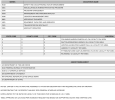And pay banding systems are still tied to the GS system. You'll see them on many USAJobs postings such as NM, NH, DP, etc. The FAA has their own pay bands that I think are alphabetical. Pay band and different systems provide a way for the agency to evaluate and recognize employee performance. For instance, in my pay system, I have to submit a twice annual FITREP like report that then gets ranked against my peers to determine payout. High performers see returns in more rapidly increasing pay and bonuses. This also allows agencies to move people up within the GS step system more rapidly than the traditional GS step increase timeframe of 1 step every three years. Although jobs can fit within bands there are often other controls. For instance, DP-05 is a pay scale that covers the 14-15 pay scale. But there's often a "control point" that caps the pay at 14 for roles that don't rate the 15 pay due to org structure, agency high grade restrictions, etc.


 . The other retired shortly after.
. The other retired shortly after.